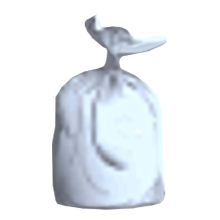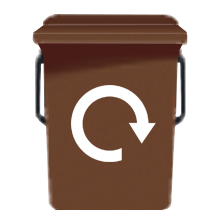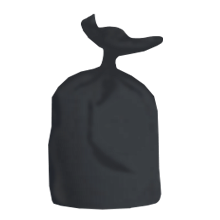Home Composting is the most environmentally friendly way of dealing with kitchen and garden waste, plus it produces compost that can be used as an excellent soil improver.
To help get you started with home composting, Guernsey Waste offers subsidised compost kits. These comprise of a composter bin, kitchen caddy and information leaflet and are available to purchase for £10.00 (RRP £35.00) from the following garden centres; Queux Plant Centre, Le Friquet Garden Centre, Guernsey Gardens, Stan Brouard, R.H Gaudion and Earlswood Garden Centre.
The handy drop downs below and information leaflet (which can be found in the downloads section of this page) should give you everything you need to get started, however if you do have any further questions please contact us at recycle@gov.gg or call us on 221234.
Getting started
- Composting is useful in all gardens. Only in the very smallest gardens will it be difficult to find a space for a compost heap and material to fill it. Owners of such small plots could consider worm composting instead.
When to compost
- Composting is done all year, as and when suitable materials are generated in the garden or home. However late summer to early winter is the peak time for making compost.
How to compost
- The site and container
- It is important that the site is not subjected to extremes of temperature and moisture as the microorganisms (bacteria and funghi) that convert the waste to compost work best in constant conditions. Position the bin in light shade or shade, it is often more convenient to use a shady area of the garden.
- An earth base allows drainage and access to soil organisms, but if you have to compost on a hard surface, then add a spade full of soil to the compost bin first.
- Enclosed bins retain some warmth and moisture and make better compost more quickly, but even an open heap (not enclosed in a bin) will compost eventually. Any of the compost bins on the market should produce compost as long as they exclude rain, retain some warmth, allow drainage and let in air.
Getting the right balance
- Aim for between 25 and 50% soft green materials e.g. grass clippings, annual weeds, vegetable kitchen waste, or manure to feed the microorganisms.
- The remainder should be woody brown material e.g. prunings, wood chippings, paper, cardboard, straw or dead leaves.
- The bacteria and micro-organisms that produce the compost function best when the balance of green and brown materials is correct.
- Avoid letting one material dominate the heap - especially grass clippings, as these can become a slimy, smelly mess on their own.
- Kitchen waste and grass clippings are best mixed with brown woody material, as they tend to be wet and easily compacted, excluding air.
Some common composting materials
- Green: grass clippings, soft leafy plants including annual weeds, fruit and vegetables, uncooked kitchen waste such as peelings, selected vegetarian pet waste/bedding.
- Brown: pruning's and hedge trimmings (ideally shredded), woodchip, leaves, paper and card (torn up or shredded), straw, plant stems.
- Accelerators and activators; products such as 'Garotta' are sometimes added where green waste is in short supply. They contain high levels of nitrogen (a nutrient found in green waste) but should not be necessary if green waste is plentiful. It is also possible to purchase activators containing carbon (a nutrient found in brown woody waste); these are aimed at composting grass clippings or other green waste where there is insufficient brown waste.
Turning the compost
- Turning the compost adds air, and air is necessary for composting to occur. If the compost is too wet it becomes compacted, then the composting process is slower as less air is available.
- Ideally, place a lot of composting materials in the bin or on the heap in one go and turn it periodically (perhaps every month) to introduce air. Failure to turn the compost is probably the main cause of poor results.
- However, many gardeners are unable to fill a heap in one go, as they accumulate waste gradually. Because of this homemade compost is seldom as perfect as municipal compost, but it is still very effective.
- Remember to keep the heap moist in dry weather - turning will give you an opportunity to assess the moisture level.
When is compost ready?
- Garden compost can take between six months and two years to reach maturity. Your compost will be dark brown, with a crumbly soil like texture and a smell resembling damp woodland.
- It is unlikely that all the material in the heap will be like this, but any remaining non-rotted material can always be added to the next batch of composting materials.
Problems
- Sometimes the results of composting are not as expected.
- Wet, slimy and strong-smelling compost: too much air and too much water are often to blame. Cover the compost to protect against rain and add more brown waste, such as chopped woody material, shredded woodchip, straw or paper.
- Fibrous with little rotting: usually caused by too little moisture and too much brown material. Add green waste or try a commercial activator or accelerator such as 'Garotta'.
- Flies: well-run compost bins don't produce swarms of flies, but if you do see these, then make sure you cover kitchen waste with garden waste after adding it to the heap and check that moisture levels are not too high, causing insufficient air in the heap.
- Grasscycling
- If you can, reduce how often you mow the lawn. Let the grass grow for a while to create a mini meadow in your garden, which small creatures will love. Wildflowers already in your lawn will grab their opportunity to bloom and the longer grass will create a sheltered environment for insects, encouraging more birds to visit. If you have a mulching mower, make the switch to grasscycling by putting the cuttings straight back as you cut.














